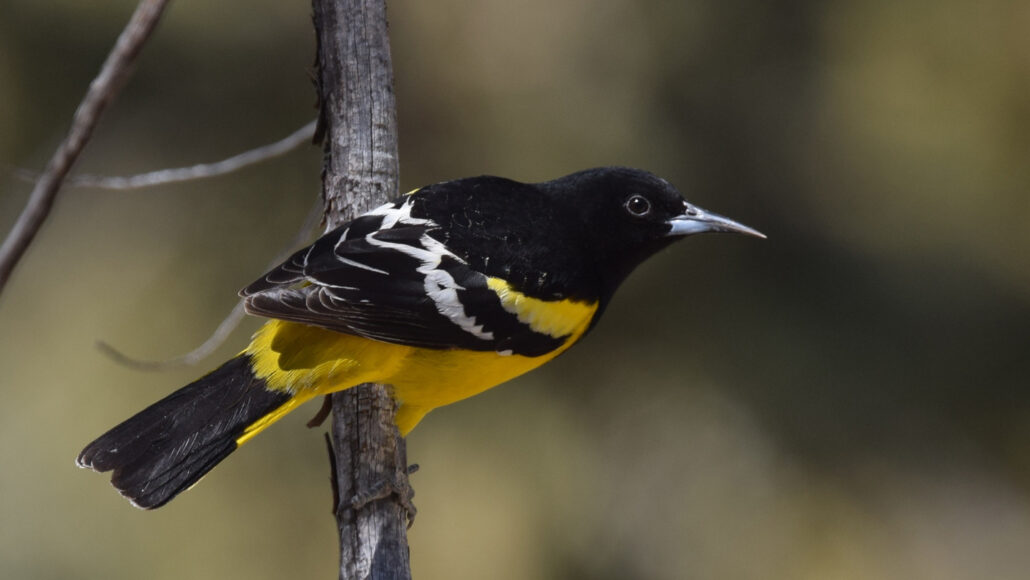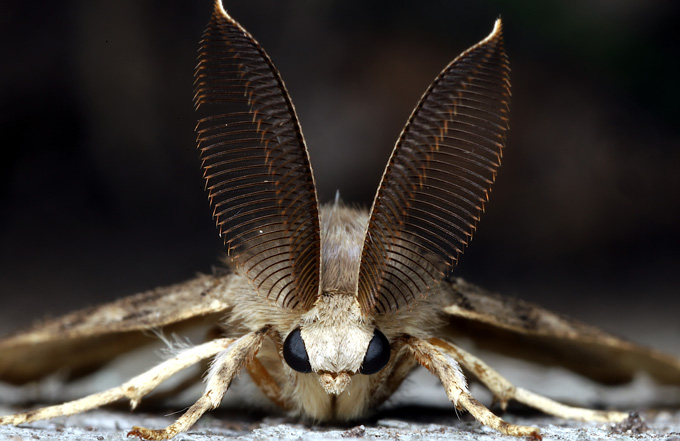Racism lurks in many plant and animal names. That’s now changing
Scientists are renaming species, like the ‘gypsy moth,’ whose names contain ethnic slurs

The Scott’s oriole (pictured) is one of dozens of North American birds named after people. The oriole bears the name of Winfield Scott, who was a U.S. military commander. Scott coordinated the forced removal of Cherokee people and other Native Americans from their land during the 1800s.
Andy Reago & Chrissy McClarren/Flickr (CC BY 2.0)
With lemon and black feathers, Scott’s oriole flashes about the desert like a flame. But this bird’s name has a violent history that Stephen Hampton can’t forget. Hampton is a birder and a citizen of the Cherokee Nation. He often saw Scott’s orioles when he lived in California. Now that he lives outside the bird’s range, “I’m kind of relieved,” he says.
The bird was named after Winfield Scott, a U.S. military commander in the 1800s. Scott drove Hampton’s ancestors and other Native Americans from their land during a series of forced marches. These marches came to be known as the Trail of Tears. The journey killed more than 4,000 Cherokee and displaced as many as 100,000 people.
“So much of the Trail of Tears is already erased,” Hampton says. “There’s a few historical sites. But you’d have to be an archaeologist to figure out where [they] were.” Linking Scott’s legacy to a bird “is just adding to the erasure” of this violence.
Scientists are now thinking about renaming the oriole. It’s just one of dozens of species that may be renamed because of racist or other offensive history.
Racist relics exist in both scientific and common names for species. Scientific names used around the world are written in Latin. But common names vary by language and region. They have a smaller reach than scientific names. In theory, that could make them simpler to change. But some common names become formally recognized by scientific societies. That can lend more credibility to names with ugly legacies.
Advocates for change argue that some of these names make science less inclusive. The names may also distract from the organisms themselves. But those advocates aren’t just focused on the negatives. They also see positive opportunities in renaming.
Insect name changes
“We can choose language that reflects our shared values,” says Jessica Ware. She’s an entomologist — someone who studies insects. She works at the American Museum of Natural History in New York City. Ware is also president-elect of the Entomological Society of America, or ESA. Name changes are nothing new, she says. Scientific and common names both shift as scientists learn more about a species. ESA updates its list of English common names for insects each year.
In July, ESA removed the term “gypsy” from its common names for two insects. That’s because many consider this word a slur for Romani people. That left a moth (Lymantria dispar) and an ant (Aphaenogaster araneoides) in need of new common names. ESA is currently inviting suggestions from the public. In the meantime, the insects will go by their scientific names.

“This is a moral, necessary and long-overdue change,” says Margareta Matache. She’s a Roma rights activist and scholar at Harvard University in Boston, Mass. It’s a “small yet historic” step, she argues, to correct portrayals where “Roma have been denied humanity or depicted as less than human.”
ESA has also launched the Better Common Names Project. It forbids insect names based on negative stereotypes. The society welcomes public input about which names to change next. So far, more than 80 insensitive names have been identified. Over 100 name ideas for the moth L. dispar have streamed in. It’s a “bottom-up swelling of names” to choose from, Ware says. “Everybody is included.”
Bird by bird
Racist legacies lurk in lingo for many kinds of species. Some scorpions, birds, fishes and flowers are known by the label Hottentot. This is a term of abuse for Indigenous Khoikhoi people in southern Africa. Likewise, the Digger pine tree contains a slur for the Paiute people. This tribe is native to the western United States. Its people were once derisively called diggers by white settlers.
Name changes
It’s not unusual for species’ names to change. Sometimes new information about a species prompts a name change. But the following examples show that names deemed offensive have been revised for at least two decades.
Pikeminnow (Ptychocheilus): Four pikeminnow fish species were once called “squawfish.” This term was based on an offensive word for Native American women. In 1998, the American Fisheries Society changed the name. The society said the original name was a violation of “good taste.”
Long-tailed duck (Clangula hyemalis): In 2000, the American Ornithological Society renamed the “Oldsquaw” duck. Advocates said the name was offensive to Indigenous communities. They also argued that the bird’s name should match what it was called in Europe. The society agreed to that reasoning. So it was dubbed the “long-tailed duck.”
Goliath grouper (Epinephelus itajara): This 800-pound fish was formerly known as the “jewfish.” The American Fisheries Society changed the name in 2001. This change was spurred by a petition stating that the name was offensive.
The bird world, in particular, has been reckoning with hurtful legacies. Many bird species identified in the 19th century were named after people. Today, 142 North American bird names are verbal monuments to people. Some names pay tribute to people who participated in genocide, like Winfield Scott. Other names honor people who defended slavery. One example is Bachman’s sparrow. “Blacks and Native Americans would have always been opposed to these names,” Hampton says.
Since 2020, the grassroots campaign Bird Names for Birds have pushed for a solution. Supporters of this effort propose renaming all birds that were named after people. The birds’ new names should describe the species. “It’s not a be-all-end-all solution” to making birding more inclusive, says Robert Driver. But it’s one gesture of “consideration for everyone who’s out there with binoculars.” Driver is an evolutionary biologist at East Carolina University. That’s in Greenville, N.C.
In 2018, Driver proposed renaming a brownish-gray bird called McCown’s longspur. This bird was named after a Confederate general. The American Ornithological Society originally rejected Driver’s idea. But in 2020, the murder of George Floyd sparked nationwide reflection on racism. As a result, some Confederate monuments were removed from public places. Sports teams began rebranding their teams with less offensive names. And the ornithology society changed its bird-naming policies. The society may now remove someone from a bird’s name if they played a role in “reprehensible events.” The McCown’s longspur has since been renamed the thick-billed longspur.
Driver wants Scott’s oriole to be next. But for now, English bird-name changes have paused. They’re on hold until the society comes up with a new name-changing process. “We are committed to changing these harmful and exclusionary names,” says Mike Webster. He’s president of the society and an ornithologist at Cornell University in Ithaca, N.Y.
Building back better
Removing harmful terms could help species names stand the test of time, Ware says. With thoughtful criteria, scientists and others can craft names built to last. “So it might be uncomfortable now,” Ware says. “But hopefully, that only happens once.”
As for Hampton, he doesn’t see Scott’s oriole anymore. His new home in Washington State is outside the bird’s range. But he still can’t escape these types of names. Sometimes while birding, he spies Townsend’s solitaire. It’s named after John Kirk Townsend, an American naturalist. Townsend collected Indigenous people’s skulls in the 1830s to measure their size. Those measurements were used to justify bogus ideas about some races being better than others.
But there’s a lot more to these little gray birds than their name’s ugly history. For instance, they love juniper berries. “Every time I see one [of the birds], I’m thinking, ‘That should be juniper solitaire,’” Hampton says. In the same way, Hampton imagines calling the Scott’s oriole the yucca oriole. That would honor the birds’ fondness for foraging on yucca plants. “I can’t wait for those [names] to be changed,” he says.







